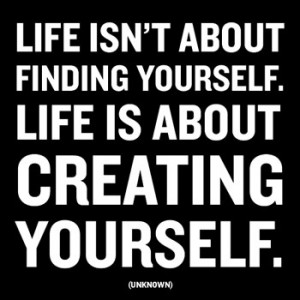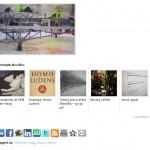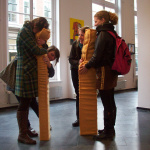To top off a small restyle of my external memory I added a 'share' possibility.…
Create yourself
 Relatively simple technology built into appliances, cars, phones, cash registers creates a mass of data. This data is gathered, processed and analysed by intelligent computer systems to show the patterns of our lives: where we drive, what people we have called, what items we have bought, what bills we have paid. Of course, these data are usually analised to forecast the behaviour of groups, but the behaviour of individuals is becoming more and more transparent as well.
Relatively simple technology built into appliances, cars, phones, cash registers creates a mass of data. This data is gathered, processed and analysed by intelligent computer systems to show the patterns of our lives: where we drive, what people we have called, what items we have bought, what bills we have paid. Of course, these data are usually analised to forecast the behaviour of groups, but the behaviour of individuals is becoming more and more transparent as well.
This would have greatly alarmed the citizen of, say, ten years ago. When the Dutch government caused every Dutch citizen to carry an identity card, criticism was loud and vehement. These days, it is no longer an issue. Another example: the discussion about road pricing. It is no longer a discussion about privacy, but a discourse about ways and means.
We seem under way to a new definition of the term ‘privacy’. There is a growing appreciation for people that present intimate details about their ‘private’ lives in public. From ‘the Big Brother house’ to ‘ Boer zoekt vrouw’, those aspects of our lives that we once shared with our mirror only are now on national television. Facebook, Linkedin, Hyves, Youtube enable us to share our quotidian lives with anyone at all.
Warren Beatty, in the film ‘In Bed with Madonna’, said “Why would you smile if it is not on camera?”. This question in another form: why take pictures if not to upload and share them? Our personal existence is no longer affirmed by the things we keep to ourselves, but by the things we make public. I show myself, therefore I am. I do encounter this in my teaching practice: when my student’s cannot find me on the ‘net, I have something to explain. In their eyes, if I don’t exist in the virtual world, I may not exist at all – at the very least they doubt my professional qualifications.
If we model ourselves by way of publicizing our lives, what forms do we model ourselves on? In what image do we make ourselves? Who/what/when/why do we decide we are? If the old power structures no longer present us with plausible forms, do we shape ourselves on personal desires? If personality is multiple – as for instance Carsten Holler firmly believes – do we change according to who we are with and what we are doing? Do we, in the end, rely on self-discipline and self-moralisation when discipline and mores are no longer provided byt the old power structures?
Taking this one step further, we may come to feel a need for constant camera surveillance, just to keep track of what personality popped up when. To feel that we have really been somewhere and were someone. And ‘play’ could become our laboratory – of doubt, of possibilities, of answers. Trying out ‘me’ until I find a plausible one under a given set of circumstances. Become both participant and viewer in our own existence.
Bourriaud in ‘the radicant’: “The notion of identity has been supplanted by that of actions performed, by the concept of staging the Self, which implies the perpetual mobility of the subject.”
| « Sutton-Smith: The Ambiguity of Play | <-- previous post | next post --> | Notes on taxonomy » |
|---|







